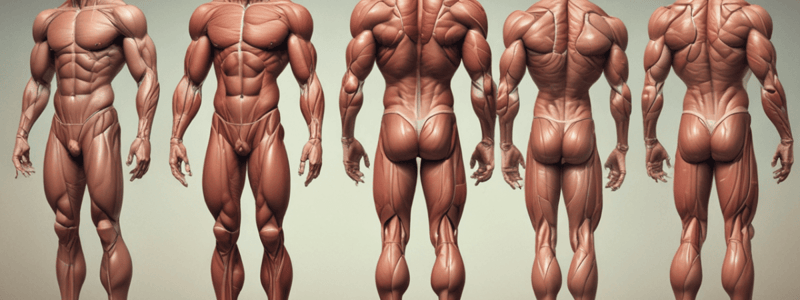Podcast
Questions and Answers
What is the primary characteristic of smooth muscle?
What is the primary characteristic of smooth muscle?
- It has a striated appearance.
- It is only found in the heart.
- It has a smooth, spindle-shaped appearance. (correct)
- It is responsible for voluntary movement.
What is the name of the condition characterized by a decline in muscle mass and strength with age?
What is the name of the condition characterized by a decline in muscle mass and strength with age?
- Muscular dystrophy
- Sarcopenia (correct)
- Muscle atrophy
- Muscle fatigue
What is a unique characteristic of cardiac muscle?
What is a unique characteristic of cardiac muscle?
- It is only found in the skeletal system.
- It is striated.
- It is voluntary.
- It is not capable of dividing. (correct)
What is the primary function of skeletal muscle?
What is the primary function of skeletal muscle?
What is a contributing factor to the decline in muscle function with age?
What is a contributing factor to the decline in muscle function with age?
What is the primary function of skeletal muscle in the human body?
What is the primary function of skeletal muscle in the human body?
What is the characteristic of cardiac muscle that allows it to contract rhythmically?
What is the characteristic of cardiac muscle that allows it to contract rhythmically?
Which type of muscle fiber is not striated?
Which type of muscle fiber is not striated?
What is the function of the endomysium in skeletal muscle?
What is the function of the endomysium in skeletal muscle?
What is the main difference between skeletal and smooth muscle in terms of structure?
What is the main difference between skeletal and smooth muscle in terms of structure?
What is the characteristic of cardiac muscle that allows it to pump blood throughout the body?
What is the characteristic of cardiac muscle that allows it to pump blood throughout the body?
Flashcards
Skeletal Muscle
Skeletal Muscle
The largest muscle type in the human body, responsible for movement and posture. It is characterized by a striated appearance due to the arrangement of actin and myosin filaments.
Cardiac Muscle
Cardiac Muscle
A type of muscle tissue that forms the heart. It is involuntary, meaning it contracts rhythmically without conscious control, and responsible for pumping blood throughout the body.
Smooth Muscle
Smooth Muscle
A type of muscle tissue found in the walls of blood vessels, organs, and other structures. It is involuntary and responsible for tasks such as maintaining organ function and regulating blood vessel diameter.
Striated Muscle
Striated Muscle
Signup and view all the flashcards
Endomysium
Endomysium
Signup and view all the flashcards
Sarcopenia
Sarcopenia
Signup and view all the flashcards
Muscle Fibers
Muscle Fibers
Signup and view all the flashcards
Actin and Myosin
Actin and Myosin
Signup and view all the flashcards
Muscle Contraction
Muscle Contraction
Signup and view all the flashcards
Muscle Hypertrophy
Muscle Hypertrophy
Signup and view all the flashcards
Muscle Atrophy
Muscle Atrophy
Signup and view all the flashcards
Study Notes
The Anatomy of the Muscular System
The muscular system is a complex network of specialized cells called muscle fibers that are responsible for the contraction of muscles, which in turn produce movement. This system is composed of three main types of muscle fibers: skeletal, cardiac, and smooth. Each type of muscle fiber has unique characteristics and functions that contribute to the overall functioning of the muscular system.
Skeletal Muscle Structure
Skeletal muscle is the largest muscle type in the human body, responsible for movement and posture. It is a striated muscle, meaning it has a distinctive striped appearance due to the arrangement of actin and myosin filaments. This muscle type consists of many individual muscle fibers, which are bound together by connective tissue. The muscle fibers themselves are also surrounded by a layer of connective tissue called the endomysium.
Cardiac Muscle Physiology
Cardiac muscle, which makes up the heart, is an involuntary muscle type that contracts rhythmically to pump blood throughout the body. Like skeletal muscle, cardiac muscle is also striated. The contractile force of cardiac muscle is generated by the interaction between actin and myosin filaments, which slide past each other, causing the muscle to shorten.
Smooth Muscle Function
Smooth muscle is an involuntary muscle type found in the walls of blood vessels, organs, and other structures. Unlike skeletal and cardiac muscle, smooth muscle is not striated. Instead, it has a smooth, spindle-shaped appearance and is responsible for performing tasks such as maintaining organ function and regulating blood vessel diameter.
Age-Related Muscle Decline
As individuals age, muscle mass and strength can decline, leading to a condition known as sarcopenia. This decline in muscle function is due to a combination of factors, including a decrease in muscle fiber size, a decline in muscle fiber number, and changes in the muscle's architecture.
In conclusion, the muscular system is a complex network of cells that plays a crucial role in the body's movement, posture, and organ function. The different types of muscle fibers, such as skeletal, cardiac, and smooth, have unique characteristics and functions that contribute to the overall health and well-being of the body. Understanding the anatomy of the muscular system can provide valuable insights into how it functions and how it may change over time.
Studying That Suits You
Use AI to generate personalized quizzes and flashcards to suit your learning preferences.




